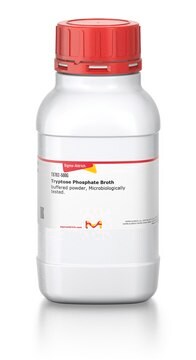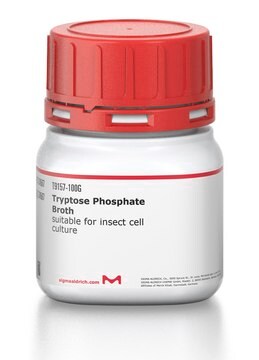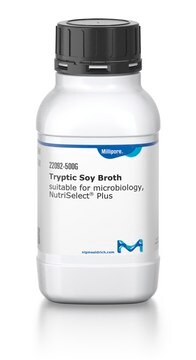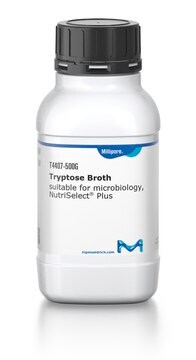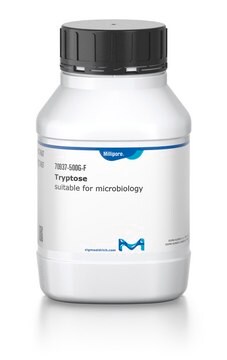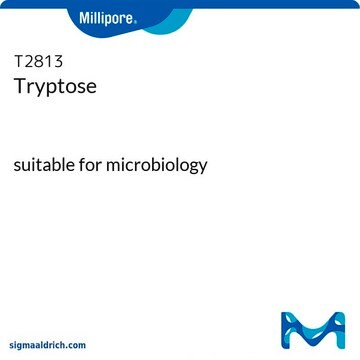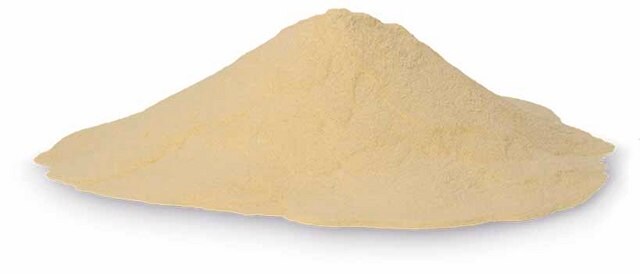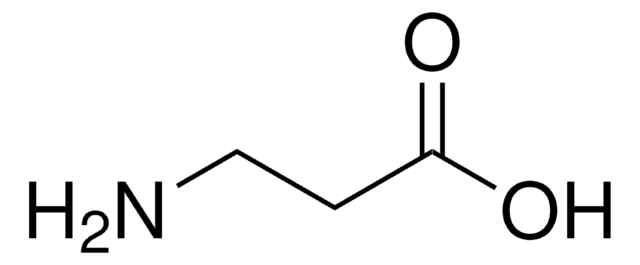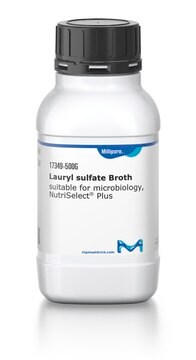T4532
Tryptose Broth
suitable for insect cell culture
Autenticatiper visualizzare i prezzi riservati alla tua organizzazione & contrattuali
About This Item
Codice UNSPSC:
41106507
NACRES:
NA.75
Prodotti consigliati
Origine biologica
Porcine pancreas
Forma fisica
liquid
tecniche
cell culture | insect: suitable
Condizioni di spedizione
ambient
Temperatura di conservazione
2-8°C
Applicazioni
In addition to its use for the growth of fastidious micro-organisms, Tryptose Phospate Broth (TPB) has been studied as supplement for the preparation of media that supports vaccine production in BHK-21 cells and the growth of SF21 insect cells in high-density perfusion culture stirred-tank bioreactors.
Componenti
Tryptose Phosphate Broth (TPB) is composed of four components: Tryptose (20g/L); Dextrose (2g/L); NaCl (5g/L) and Disodium Phosphate (2.5g/L) typically adjusted to pH 7.3. The tryptose component is a peptone (mixture of amino acids and short peptides) derived by the mixed enzymatic hydrolysis (pancreatic enzymes) of the milk protein casein. This hydrolysate provides a source of amino acid based nutrients and survival factors that support the growth of fastidious micro-organisms such as Brucella, Streptococcus, and Neisseria; as well as eukaryotic cells such as insect and animal cells. Dextrose provides a fermentable carbohydrate that can be used by fastidious mico-organisms. Sodium chloride maintains the osmotic and ionic equilibrium and disodium phosphate provides the basic buffering capacity.
Altre note
This Tryptose broth is closely related to Tryptose phosphate broth, but does not contain the phosphate component and it contains a lower concentration of dextrose.
Nota sulla preparazione
This formulation contains Tryptose (20 g/L); Dextrose (1 g/L); and NaCl (5g/L) adjusted to a final pH of 7.2.
Comunemente ordinati con questo prodotto
N° Catalogo
Descrizione
Determinazione del prezzo
Prodotto comparabile
Codice della classe di stoccaggio
12 - Non Combustible Liquids
Classe di pericolosità dell'acqua (WGK)
nwg
Punto d’infiammabilità (°F)
Not applicable
Punto d’infiammabilità (°C)
Not applicable
Certificati d'analisi (COA)
Cerca il Certificati d'analisi (COA) digitando il numero di lotto/batch corrispondente. I numeri di lotto o di batch sono stampati sull'etichetta dei prodotti dopo la parola ‘Lotto’ o ‘Batch’.
Possiedi già questo prodotto?
I documenti relativi ai prodotti acquistati recentemente sono disponibili nell’Archivio dei documenti.
I clienti hanno visto anche
S N Saha et al.
Vaccine, 7(4), 357-363 (1989-08-01)
Studies were undertaken to develop a cheaper medium with indigenous sources of peptone and casein hydrolysate for continuous culture of BHK-21 (suspension) cells and production of foot-and-mouth disease (FMD) vaccine. Eleven batches of experimental media were prepared using different indigenous
A I Josemans et al.
Annals of the New York Academy of Sciences, 969, 141-146 (2002-10-17)
The in vitro culture of Cowdria ruminantium, the causative agent of heartwater in domestic ruminants, was first achieved in 1985. Culture media were usually supplemented with serum and tryptose phosphate broth, both undefined components, contributing to great variability. Recently, we
S M Deutschmann et al.
Enzyme and microbial technology, 16(6), 506-512 (1994-06-01)
Spodoptera frugiperda insect cells (IPLB-Sf21-AE) (Sf21), infected with baculovirus expression vectors during their exponential growth phase, are commonly used to produce a variety of heterologous recombinant proteins. In the present study the culture conditions of these insect cells were studied
Il team dei nostri ricercatori vanta grande esperienza in tutte le aree della ricerca quali Life Science, scienza dei materiali, sintesi chimica, cromatografia, discipline analitiche, ecc..
Contatta l'Assistenza Tecnica.